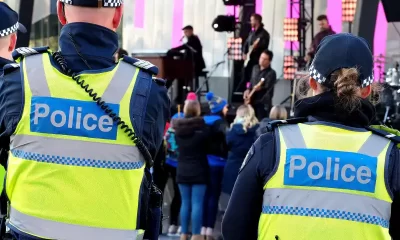Business
Berkeley Officials Consider Move To Decriminalize Hallucinogens

The proposal would legalize LSD.
Officials in Berkeley, California are set to consider a proposal that would decriminalize psychedelics, including LSD.
The measure is a byproduct of a years-long project that has “lingered for three years in the Berkeley City Council,” according to Berkeleyside, which added that the council is set to “come back to life in a few weeks.”
What distinguishes Berkeley’s proposal from other communities that have moved to legalize hallucinogens is that the northern California city would represent “an even broader proposal: one that could make it the first in the U.S. to decriminalize LSD,” according to Berkeleyside.
“Of the 15 U.S. cities that have softened restrictions on psychedelics, none has included this synthetic hallucinogen. Berkeley Community Health Commissioners Joseph Holcomb Adams and Karma Smart explained that the logic for decriminalizing LSD is that it meets the technical definition of psychedelics,” Berkeleyside reported.
“Berkeley’s resolution was initially drafted by the Oakland-based nonprofit Decriminalize Nature in 2019, and proposed decriminalizing only natural psychedelics, such as psilocybin mushrooms, ayahuasca, and mescaline cacti,” the outlet continued. “The resolution spent two years in the hands of the city’s Community Health Commission (CHC), one of 22 civil commissions advising the City Council. Over the last year, Adams and Smart, the two commissioners appointed to study it, entirely rewrote it. If approved by the City Council, the personal consumption of psychedelics will cease to be criminalized in Berkeley; sharing, giving, or distributing psychedelics will, however, continue to be crimes.”
According to NBC Bay Area, Berkeley “city health commissioners voted unanimously to recommend to the city council decriminalize the use of hallucinogens.”
The legalization and decriminalization of hallucinogens has emerged as the latest frontier in the United States’ drug reform movement.
Earlier this month, U.S. Sens. Cory Booker, a Democrat, and Rand Paul, a Republican, introduced a bill requiring the Drug Enforcement Administration (DEA) to classify therapies involving psilocybin and MDMA in order to improve access for patients and researchers.
“Recent studies suggest that some Schedule I substances such as MDMA and psilocybin could represent an enormous advancement for the treatment of severe post-traumatic stress disorder, depression and addiction,” Booker said in a statement. “Unfortunately, regulatory red tape and a series of bureaucratic hurdles involved in studying Schedule I substances impedes critical research on these and other promising Schedule I compounds. This bill reduces these unreasonably burdensome rules and regulations that delay or prevent researchers from studying – and patients from accessing – this entire class of potential medicines.”
Paul said he was proud to co-lead this legislation, which is known as the Breakthrough Therapies Act, with Sen. Booker that would streamline the registration process for breakthrough therapies currently restricted by outdated drug classifications.
“This bill will make it easier for researchers to conduct studies that can lead to breakthrough therapies to treat patients battling serious and life-threatening conditions,” Paul said in a statement.
The legislation has won the endorsement of Martin R. Steele, a retired United States Marine Corps lieutenant general who leads the Veteran Mental Health Leadership Coalition.
“We urge Congress to swiftly pass the Breakthrough Therapies Act, which responsibly reduces the barriers to research and limited access of potentially life-saving treatments like MDMA- and psilocybin-assisted therapy,” said Steele. “Veterans should not be forced (nor should anyone else) to leave the country – at great expense – to access breakthrough therapies that can be safely provided and further studied in real-world settings here at home.”
Should the bill pass and become law, it would force the DEA to reschedule the aforementioned substances under the Controlled Substances Act.
Source: https://hightimes.com/psychedelics/berkeley-officials-consider-move-to-decriminalize-hallucinogens/
Business
New Mexico cannabis operator fined, loses license for alleged BioTrack fraud

New Mexico regulators fined a cannabis operator nearly $300,000 and revoked its license after the company allegedly created fake reports in the state’s traceability software.
The New Mexico Cannabis Control Division (CCD) accused marijuana manufacturer and retailer Golden Roots of 11 violations, according to Albuquerque Business First.
Golden Roots operates the The Cannabis Revolution Dispensary.
The majority of the violations are related to the Albuquerque company’s improper use of BioTrack, which has been New Mexico’s track-and-trace vendor since 2015.
The CCD alleges Golden Roots reported marijuana production only two months after it had received its vertically integrated license, according to Albuquerque Business First.
Because cannabis takes longer than two months to be cultivated, the CCD was suspicious of the report.
After inspecting the company’s premises, the CCD alleged Golden Roots reported cultivation, transportation and sales in BioTrack but wasn’t able to provide officers who inspected the site evidence that the operator was cultivating cannabis.
In April, the CCD revoked Golden Roots’ license and issued a $10,000 fine, according to the news outlet.
The company requested a hearing, which the regulator scheduled for Sept. 1.
At the hearing, the CCD testified that the company’s dried-cannabis weights in BioTrack were suspicious because they didn’t seem to accurately reflect how much weight marijuana loses as it dries.
Company employees also poorly accounted for why they were making adjustments in the system of up to 24 pounds of cannabis, making comments such as “bad” or “mistake” in the software, Albuquerque Business First reported.
Golden Roots was fined $298,972.05 – the amount regulators allege the company made selling products that weren’t properly accounted for in BioTrack.
The CCD has been cracking down on cannabis operators accused of selling products procured from out-of-state or not grown legally:
- Regulators alleged in August that Albuquerque dispensary Sawmill Sweet Leaf sold out-of-state products and didn’t have a license for extraction.
- Paradise Exotics Distro lost its license in July after regulators alleged the company sold products made in California.
Golden Roots was the first alleged rulebreaker in New Mexico to be asked to pay a large fine.
Source: https://mjbizdaily.com/new-mexico-cannabis-operator-fined-loses-license-for-alleged-biotrack-fraud/
Business
Marijuana companies suing US attorney general in federal prohibition challenge

Four marijuana companies, including a multistate operator, have filed a lawsuit against U.S. Attorney General Merrick Garland in which they allege the federal MJ prohibition under the Controlled Substances Act is no longer constitutional.
According to the complaint, filed Thursday in U.S. District Court in Massachusetts, retailer Canna Provisions, Treevit delivery service CEO Gyasi Sellers, cultivator Wiseacre Farm and MSO Verano Holdings Corp. are all harmed by “the federal government’s unconstitutional ban on cultivating, manufacturing, distributing, or possessing intrastate marijuana.”
Verano is headquartered in Chicago but has operations in Massachusetts; the other three operators are based in Massachusetts.
The lawsuit seeks a ruling that the “Controlled Substances Act is unconstitutional as applied to the intrastate cultivation, manufacture, possession, and distribution of marijuana pursuant to state law.”
The companies want the case to go before the U.S. Supreme Court.
They hired prominent law firm Boies Schiller Flexner to represent them.
The New York-based firm’s principal is David Boies, whose former clients include Microsoft, former presidential candidate Al Gore and Elizabeth Holmes’ disgraced startup Theranos.
Similar challenges to the federal Controlled Substances Act (CSA) have failed.
One such challenge led to a landmark Supreme Court decision in 2005.
In Gonzalez vs. Raich, the highest court in the United States ruled in a 6-3 decision that the commerce clause of the U.S. Constitution gave Congress the power to outlaw marijuana federally, even though state laws allow the cultivation and sale of cannabis.
In the 18 years since that ruling, 23 states and the District of Columbia have legalized adult-use marijuana and the federal government has allowed a multibillion-dollar cannabis industry to thrive.
Since both Congress and the U.S. Department of Justice, currently headed by Garland, have declined to intervene in state-licensed marijuana markets, the key facts that led to the Supreme Court’s 2005 ruling “no longer apply,” Boies said in a statement Thursday.
“The Supreme Court has since made clear that the federal government lacks the authority to regulate purely intrastate commerce,” Boies said.
“Moreover, the facts on which those precedents are based are no longer true.”
Verano President Darren Weiss said in a statement the company is “prepared to bring this case all the way to the Supreme Court in order to align federal law with how Congress has acted for years.”
While the Biden administration’s push to reschedule marijuana would help solve marijuana operators’ federal tax woes, neither rescheduling nor modest Congressional reforms such as the SAFER Banking Act “solve the fundamental issue,” Weiss added.
“The application of the CSA to lawful state-run cannabis business is an unconstitutional overreach on state sovereignty that has led to decades of harm, failed businesses, lost jobs, and unsafe working conditions.”
Business
Alabama to make another attempt Dec. 1 to award medical cannabis licenses

Alabama regulators are targeting Dec. 1 to award the first batch of medical cannabis business licenses after the agency’s first two attempts were scrapped because of scoring errors and litigation.
The first licenses will be awarded to individual cultivators, delivery providers, processors, dispensaries and state testing labs, according to the Alabama Medical Cannabis Commission (AMCC).
Then, on Dec. 12, the AMCC will award licenses for vertically integrated operations, a designation set primarily for multistate operators.
Licenses are expected to be handed out 28 days after they have been awarded, so MMJ production could begin in early January, according to the Alabama Daily News.
That means MMJ products could be available for patients around early March, an AMCC spokesperson told the media outlet.
Regulators initially awarded 21 business licenses in June, only to void them after applicants alleged inconsistencies with how the applications were scored.
Then, in August, the state awarded 24 different licenses – 19 went to June recipients – only to reverse themselves again and scratch those licenses after spurned applicants filed lawsuits.
A state judge dismissed a lawsuit filed by Chicago-based MSO Verano Holdings Corp., but another lawsuit is pending.
Source: https://mjbizdaily.com/alabama-plans-to-award-medical-cannabis-licenses-dec-1/
-

 Business2 years ago
Business2 years agoPot Odor Does Not Justify Probable Cause for Vehicle Searches, Minnesota Court Affirms
-

 Business2 years ago
Business2 years agoNew Mexico cannabis operator fined, loses license for alleged BioTrack fraud
-

 Business2 years ago
Business2 years agoAlabama to make another attempt Dec. 1 to award medical cannabis licenses
-

 Business2 years ago
Business2 years agoWashington State Pays Out $9.4 Million in Refunds Relating to Drug Convictions
-

 Business2 years ago
Business2 years agoMarijuana companies suing US attorney general in federal prohibition challenge
-

 Business2 years ago
Business2 years agoLegal Marijuana Handed A Nothing Burger From NY State
-

 Business2 years ago
Business2 years agoCan Cannabis Help Seasonal Depression
-

 Blogs2 years ago
Blogs2 years agoCannabis Art Is Flourishing On Etsy













